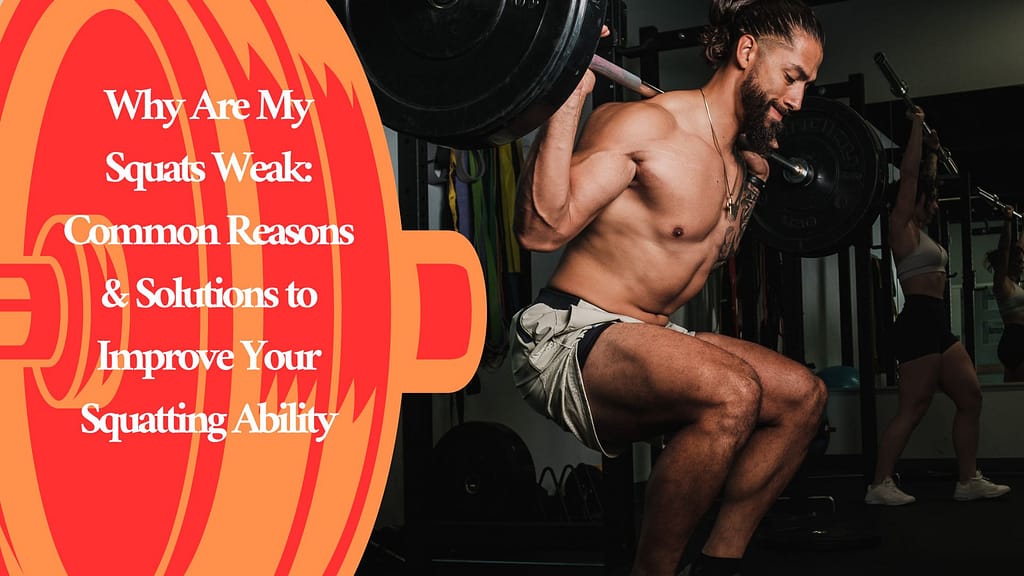If you’re wondering why your squats are weak, there could be several reasons why. While squatting is a popular exercise that targets multiple muscle groups, it’s also a complex movement that requires proper technique, strength, and mobility.
In this post, I will explore some of the common reasons why your squats may be weak and provide tips on how to overcome these challenges to improve your squatting ability.
There could be several reasons why your squats are weak. Here are some possible factors to consider: Poor technique, Weak muscles, Lack of mobility, Inconsistent training, Inadequate recovery, In summary, weak squats can be attributed to a variety of factors, including poor technique, weak muscles, lack of mobility, inconsistent training, and inadequate recovery. By addressing these factors, you can work towards improving your squatting ability and achieving your strength goals.
Poor technique:
Poor technique is one of the common reasons why many people struggle with their squats.
Squatting with improper form can limit the amount of weight you can lift and increase the risk of injury.
Another mistake is allowing your knees to track too far forward over your toes, which can put excessive pressure on your knees and cause pain or injury over time.
Other common technique errors include rounding your back, not engaging your core, and not squatting to an appropriate depth.
Rounding your back during a squat can put pressure on your spine and increase the risk of injury. Engaging your core helps stabilize your spine and ensures that you maintain proper alignment throughout the movement.
Squatting to an appropriate depth means that you should aim to break parallel (thighs parallel to the ground) to ensure that you’re engaging your glutes and hamstrings effectively.
Improve your squat techniques
To improve your technique, it’s essential to practice proper squatting form regularly. Consider working with a trainer or coach who can provide guidance and feedback on your form.
Start by practicing bodyweight squats and gradually adding weight as your technique improves. Focus on keeping your knees behind your toes, engaging your core, maintaining a neutral spine, and squatting to an appropriate depth. By practicing good technique, you can improve your squatting ability and reduce the risk of injury.
Weak muscles:
Weak muscles can be a significant factor in limiting your squatting ability. And sinc squat is a compound movement that requires strength from several muscle groups, including the quadriceps, glutes, and hamstrings.
If these muscles are weak, you may struggle to lift heavier weights and progress with your squatting ability.
One of the most common muscle groups that can limit your squats is the quadriceps, which are the muscles at the front of your thighs.
If your quads are weak, you may find it challenging to squat low and lift heavier weights. Consider incorporating exercises that target your quads, such as lunges, leg extensions, and leg presses.
Another muscle group that is essential for squatting is your glutes. Weak glutes can limit your ability to generate power from your hips and cause your knees to cave in during the squat.
Exercises such as squats, deadlifts, and lunges can help strengthen your glutes.
Weak hamstrings can also limit your squatting ability. These muscles are responsible for hip extension and play a significant role in generating power during the squat.
Improve your weak muscles
Exercises such as deadlifts, Romanian deadlifts, and glute-ham raises can help strengthen your hamstrings.
To improve your squatting ability, consider incorporating exercises that target these muscle groups into your training routine.
Aim to progressively increase the weight or volume of these exercises over time to stimulate muscle growth and improve your strength.
By strengthening your muscles, you can improve your squatting ability and work towards achieving your strength goals.

Lack of mobility:
Another common reason why many people struggle with their squats is the lack of mobility. Proper squatting form requires a significant range of motion in your hips, knees, and ankles.
If you have limited mobility in these areas, you may find it difficult to achieve proper depth and maintain proper alignment during the squat.
One of the most common areas of limited mobility is the ankles. Limited ankle mobility can cause your heels to lift off the ground during the squat, which can shift your weight forward and put excessive pressure on your knees. Consider incorporating ankle mobility exercises such as ankle circles, calf stretches, and ankle dorsiflexion exercises to improve your ankle mobility.
Another area of limited mobility that can affect your squats is your hips. Tight hips can limit your ability to achieve proper depth and cause your knees to cave in during the squat.
Exercises such as hip flexor stretches, pigeon pose, and hip openers can help improve your hip mobility and flexibility.
Limited mobility in your thoracic spine (upper back) can also affect your squatting ability. A rounded upper back can cause your chest to collapse and shift your weight forward, making it challenging to maintain proper alignment during the squat.
Improve your mobility
Exercises such as thoracic spine mobility drills and foam rolling can help improve your upper back mobility and allow you to maintain proper posture during the squat.
To improve your mobility, consider incorporating mobility exercises into your warm-up routine before squatting.
Aim to address areas of limited mobility by performing exercises that target those specific areas. By improving your mobility, you can achieve proper squatting form and reduce the risk of injury.
Inconsistent training:
Inconsistent training can be a significant limit to your squatting ability. Squatting, like any other physical activity, requires consistent and regular training to make progress.
If you have an inconsistent training schedule or take long breaks between training sessions, you may find it difficult to make progress with your squats.
When you don’t train regularly, your muscles and nervous system don’t get enough stimulation to adapt and improve.
As a result, your squatting ability may plateau or even decline. Inconsistent training can also make it harder to maintain proper form and technique, which can increase the risk of injury.
Overcome inconsistent training
To overcome this challenge, it’s essential to establish a consistent training routine that includes regular squatting sessions.
Aim to squat at least two to three times per week and gradually increase the volume and intensity of your training over time. This will help your muscles adapt and improve and allow you to progress with your squatting ability.
Another strategy to overcome inconsistent training is to set specific and measurable goals for your squatting ability.
Having a clear goal in mind can help motivate you to train consistently and make progress towards achieving your goal. Consider working with a personal trainer or strength coach who can help you develop a training plan and hold you accountable for your goals.
Inconsistent training can limit your squatting ability and make it difficult to achieve your strength goals. To overcome this challenge, establish a consistent training routine, set specific and measurable goals, and work with a coach or trainer to develop a training plan that suits your needs and abilities.
Inadequate recovery:
Squatting is a physically demanding exercise that places a significant amount of stress on your muscles and nervous system. Without proper recovery, your muscles may not have enough time to recover and adapt, which can limit your squatting ability.
Inadequate recovery can take many forms, including not getting enough sleep, not giving your muscles enough time to rest between squatting sessions, and not fueling your body with the nutrients it needs to recover properly.
One of the most critical aspects of recovery is getting enough sleep. Sleep is when your body repairs and regenerates its tissues, including your muscles.
Consider incorporating active recovery strategies
Aim to get at least seven to eight hours of sleep each night, and try to maintain a consistent sleep schedule to optimize your recovery.
Another essential aspect of recovery is allowing your muscles enough time to rest and recover between squatting sessions.
Aim to space your squatting sessions at least 48 to 72 hours apart to give your muscles enough time to recover fully.
Consider incorporating active recovery strategies such as foam rolling, stretching, or light aerobic exercise on your rest days to promote recovery.
Proper nutrition is essential for muscle recovery and adaptation. Make sure to consume enough protein to support muscle growth and repair, as well as carbohydrates and healthy fats to fuel your workouts and promote recovery.
Aim to consume a variety of nutrient-dense foods, including lean proteins, whole grains, fruits, and vegetables, to provide your body with the nutrients it needs to recover and perform optimally.
Inadequate recovery can limit your squatting ability by preventing your muscles from recovering and adapting properly.
To optimize your recovery, aim to get enough sleep, space your squatting sessions appropriately, and fuel your body with the nutrients it needs to recover and perform optimally.
Conclusion
In conclusion, there are several reasons why your squats may be weak, including poor technique, weak muscles, lack of mobility, inconsistent training, and inadequate recovery.
By identifying and addressing these factors, you can overcome the challenges that are limiting your squatting ability and make progress toward achieving your strength goals.
To improve your squats, consider working with a coach or trainer, establishing a consistent training routine, focusing on proper technique and form, incorporating exercises to improve mobility and strength, and prioritizing recovery through adequate sleep and nutrition.
With dedication and hard work, you can overcome these challenges and improve your squatting ability, leading to improved overall strength and fitness.

Hey there, it’s Mike Rrsq, the Editor-in-Chief over at Jsquat.com, and I’m absolutely obsessed with all things squat fitness! I’ve been lucky enough to get some serious recognition for my work in this field. With a solid background in the fitness and wellness industry, I’ve been there right from the get-go, helping shape this website into what it is today.
You see, I’m not just the boss around here; I’m also a passionate contributor. I love sharing my insights through my articles, and trust me, they’re not your run-of-the-mill stuff. Each piece I write is a labor of love, filled with my expertise and real-world experience in the fitness universe. So, if you’re into fitness and looking for some inspiration, you’re in the right place!

